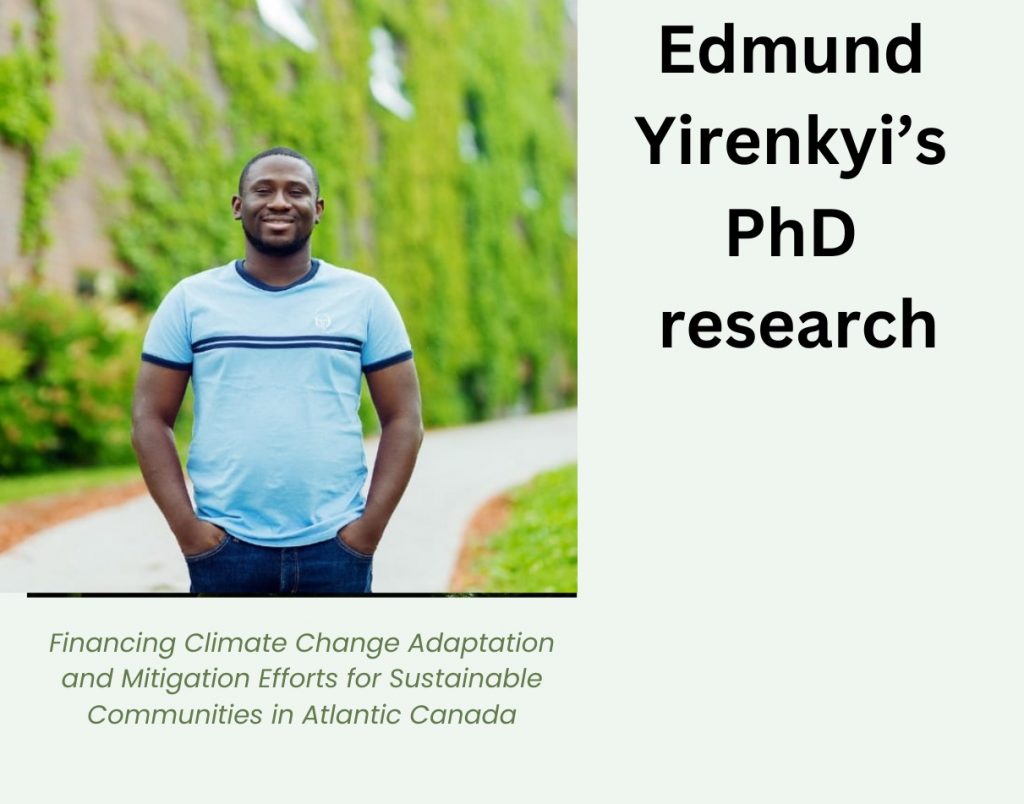By Edmund Yirenkyi
Attention to climate change risks and adaptation has intensified in recent times (Tchoukaleyska et al., 2021). Climate change is happening, as reflected by several weather- and climate-related events, such as the increased frequency and intensity of hurricanes and forest fires and the high frequency of droughts causing loss of agriculture productivity in various parts of the world. The impact of climate change is threatening roads, buildings, water and energy systems, community health and well-being, as well as ecological integrity, food provisioning, and economic vitality (Vodden et al., 2014). Climate adaptation and mitigation in many countries has progressed steadily from research to public engagement to actions that reduce the impacts of climate change. All levels of government, along with other societal actors, have developed climate change adaptation strategies and are investing in specific mitigation and adaptation measures (Bednar et al., 2018). The research will be based on existing provisions and frameworks on climate finance for adaptation and mitigation within the Atlantic Canadian context.
One key challenge to climate change adaptation and mitigation is financing. Lack of finance is one of the main factors behind slow economic growth in developing and underdeveloped countries (UNEP, 2019). While many regions are striving to obtain the necessary funding for their basic infrastructure and to restore the lives of their citizens after the impact of COVID-19 (Timilsina, 2021), how can they afford to invest in plans and actions to reduce GHGs and climate change impacts (such as climate-resilient infrastructure which requires significant upfront investment)?
Both government and the private sector are being encouraged through various means to contribute to climate change adaptation financing. In addition, the “third sector”, which includes foundations, for example, has a role to play in climate change adaptation and mitigation. While it would be more economical to adapt proactively to climate change compared to coping with the anticipated damage after not doing so, the demand for capital globally is estimated to range to hundreds of billions (UNFCCC, 2021). A crucial question, therefore, is how philanthropic organizations and the private sector can be further attracted to invest climate change? Furthermore, how can we ensure that investments made maximize impact in terms of reducing GHGs and climate change impacts?
To explore the role of multiple actors in community-level climate change action, with a particular focus on philanthropic actors and financing partnerships between private, public and third-sector players to help communities to adapt to climate change, this study has three major objectives. First, adaptation cost estimates for various communities in Atlantic Canada based on previous research will be collected. Second, an inventory of existing community-level climate initiatives in the region will be compiled along with an investigation of how these initiatives were financed. Many of these initiatives are being implemented at the local or community scale, which is the focus of this study. Third, an assessment of these existing financing arrangements and their climate mitigation and/or adaptation impacts will be conducted using a case study approach. The research will employ a largely qualitative approach to data collection and will also draw upon information that will be collected from relevant literature. This will include interviews with key municipal government officials, philanthropic foundations, and climate scientists to better understand the needs and impact of investments. Interviews will complement secondary sources to provide deeper insights, including perceptions of multiple actors as well as indicators of investment impact from a range of sources.
The research will be conducted by Edmund Yirenkyi under the doctoral program in Transdisciplinary Sustainability at Grenfell Campus with the Rural Community Foundation of Nova Scotia (RCFNS) as a research partner and funded by the Canadian Philanthropy Partnership Research Network (PhiLab). Ultimately, this research will result in publications in leading international venues with additional contributions to the PhiLab, such as blog posts and conference presentations.
References
Bednar, D., Raikes, J., & McBean, G. (2018). The governance of climate change adaptation in Canada. Toronto, Ontario: Institute for Catastrophic Loss Reduction.
United Nations Environment Programme. (2019). Climate change adaptation—Fact sheet. Nairobi, Kenya: UNEP.
Tchoukaleyska, R., Richards, G. W., Vasseur, L., Manuel, P., Breen, S.-P., Olson, K., . . . Vodden, K. (2021). Special issue introduction: Climate change knowledge translation. Journal of Community Engagement and Scholarship, 13(3), 1-7.
Timilsina, G. R. (2021). Financing climate change adaptation: International initiatives. Sustainability, 13, 1-19. doi:doi.org/10.3390/su13126515
UNFCCC. (2021). Report of the Green Climate FUnd to the Conference of the Parties. Conference of the PArties (pp. 1-141). Glasgow: United Nations Framework Convention on Climate Change.
Vodden, K., A, C. W., Harper, S. L., Kipp, A., King, N., Manners, S., . . . Rethoret, L. (2014). Rural and remote communities. In Field, E.A. Canada in a changing climate: National issues. Government of Canada.
